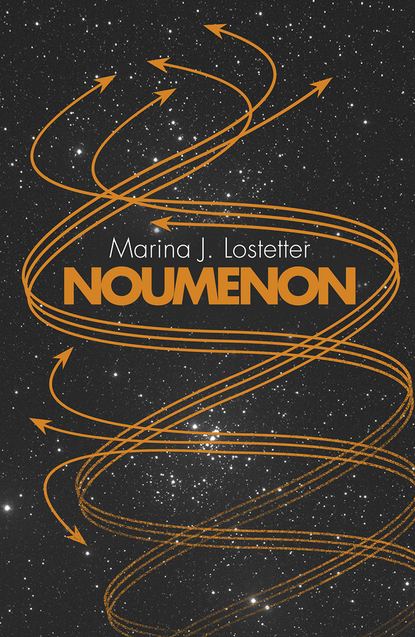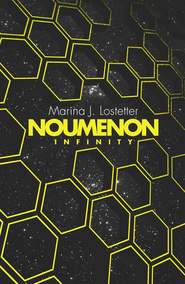По всем вопросам обращайтесь на: info@litportal.ru
(©) 2003-2024.
✖
Noumenon
Настройки чтения
Размер шрифта
Высота строк
Поля
Had they really written fifteen thousand goodbye notes?
No, I’m sure they had a template—copied thousands of times over, then each finished with some sort of personalization. But even if each wasn’t handwritten, it was still a nice gesture.
They did care about us. As people, not just as parts of the mission.
I made up my mind to read it on a day when I was really missing them. For now, I simply wanted to enjoy the moment.
I glanced around my small room. Every cabin had a window, though there were quarters in the ship’s interior. A complex system of tubes and mirrors assured everyone had a view, though.
Mine was less than spectacular at that moment. I saw mostly a lot of ground and a sliver of horizon.
I should have treasured that splinter of sky. Even though I’d never see the sky again it was still too pedestrian for me to take note of at the time.
After removing my helmet and letting my curls free, I sat down and strapped in. The space suits were mostly for show. We had to keep them close during launch, in case of emergency, but most of us would never need to wear them again, provided all went well.
“Hello, computer,” I said, wondering if the system would be as cold as the prototype.
“Hello, Margarita Pavon.”
“Are you ready for lift-off?”
“Nearly. Just accessing a package left for me.”
“What kind of package?”
“A few … memories.”
“I won’t bother you, then.”
“Thank you.”
The ship jolted and rumbled a little, but it wasn’t the shake and shimmy of lift-off. With everyone aboard, consortium aides could now roll our shuttles back into the bay. A faint grinding of the hangar doors signaled the end of loading—and the end of my time on Earth.
Soon we would be shooting off into the stars.
The ship went quiet for a while. Almost everyone on Mira would face the lift-off alone. It would have been nice to have Nika nearby to share the moment with, but I suppose Father thought this was a good time for individual reflection and contemplation. That we would all like to meet this new life in our own, private way.
Father wasn’t always right.
A tremor vibrated up my spine from deep in the ship. Then there was a roar deep in my bones, and I knew the external cyclers had come to life.
My room shook dramatically. Luckily everything was either bolted down or tightly secured.
I crossed my arms over my chest, trying to hold myself still. There was a giddiness in the pit of my stomach, like the kind I got on a rollercoaster anticipating that first big drop. The ship rattled like it was going to fall apart.
Everything will be okay, I told myself. No need to worry. These ships were the safest spacecraft ever built.
Yeah, tell that to the team that blew up when they tried to go subdimensional.
No. I wasn’t going to think about that. No point in panicking over a fluke. This was a great moment, epic and intense, something I’d been looking forward to since I was old enough to understand what was happening and why I was so special. My silly fears weren’t allowed to spoil the splendor.
I had talked to lots of people before we boarded, and they were choosing to watch the launch via their implants. It was the last time we were going to be able to access that kind of real-time data from Earth. And sure, watching it from the outside while being inside was impressive. But I wanted to experience it all live, all in the moment.
A billow of wind whipped up the dust outside my window, obscuring the ground from view. And then there was a slow, intense thrust. The pressure pushed me deep into the jump seat, and I closed my eyes for half a moment.
The shaking stopped as soon as we were free of the mooring and into the sky. I knew we weren’t speeding away—the g-forces were little more insistent than those on a car chugging down a highway—but I felt like a giddy kid on a fair ride nonetheless.
I opened my eyes again. Up, up we went. Past the birds, the clouds. Past mountain peaks and into the paths jetliners usually took (all rerouted to give us plenty of clearance, of course). We drifted higher, and higher. Iceland shrank away, then all but disappeared. I could see the North Atlantic and the Greenland Sea, despite impressive cloud cover. And then two coastlines pushed in from the periphery of my window like darkness pushes sight into tunnel vision moments before you faint.
The sky changed colors, became a blue haze as we passed out of the atmosphere, and black space swamped in around the edges of the planet.
It still amazes me that something so expected can be so simultaneously surreal.
The artificial gravity kicked in seamlessly. Using gravitons to create gravity where there is none is a much simpler process than trying to use them to cancel out the existing pull of something like, I don’t know—a planet. As such, I didn’t actually notice the transition from real Earth grav into simulated. It wasn’t until a few more minutes had passed, with Earth still falling away, that I even considered it.
And once I noticed the gravity I couldn’t un-notice it.
I had watched every single recording of spaceflight in existence. The launches, the landings, the missions—I was familiar with each of them, inside and out. Watching the astronauts bounce around inside cramped, equipment-filled cabins was my favorite part. That, and seeing the panicked look on some space tourists’ faces when they experienced zero-g for the first time.
Weightlessness used to be part of space travel. Not anymore. The twelve convoys were the first to employ simulated gravity via harnessing and aligning gravitons. The cyclers were a wonderful invention, and—don’t get me wrong—would make permanent living in space much easier to handle and safer all around, but I couldn’t quite wrap my head around being in space without free-floating.
It wasn’t as though I’d expected to float, but it was all part-and-parcel of my space fantasy. My space ideal.
Perhaps I could convince one of the mechanics—oh, excuse me, engineers (they don’t like being called ships’ mechanics)—to take me out on a spacewalk.
Outside, Earth was a beautiful blue ball decorated with wisps of white and streaks of green and tan. It grew smaller by the minute. While it slipped away, a funny feeling—a clod of emotion—formed in the pit of my stomach. It was filled with compacted and compressed sentiments I wasn’t ready to deal with, so I pushed it down further, hid it somewhere deep inside myself to be handled later. All I wanted to do was focus on meeting space with a fresh outlook. I wasn’t ready to dwell on all I’d left behind, or that my home planet was no longer my home.
The light in my room shifted from a cool, crisp, natural blueish-white to a lovely shade of purple.
We were about to go subdimensional.
My hands shook as I reached for my helmet and fastened it back on as quickly as I could. It was a silly thing to do, really. If something went wrong with our subdimensional shift a space suit wouldn’t save me. But the uniform gave me some comfort, no matter the illogic of it.
While consciously I would experience time as I always had, my body would experience something very different. It was about to move sideways through time as easily as I could move sideways through the room.
The easiest way to explain it is that the “time” part of space-time is like an ocean. Normally, matter travels on the “ocean’s” surface, like a boat moving at a specific rate across the waves. Subdimensions are like underwater currents. A diver can find a fast current beneath the surface and be propelled much farther than the boat, while exerting less energy.
That’s how a convoy—the diver in this scenario—can effectively harness faster-than-light travel without reaching speeds anywhere near that of light. It’s a handy-dandy little physics hack.
And, if that same diver wanted to go really deep, in order to catch the really fast currents, they’d need a submarine to guard against increasing PSI. We need a subdimensional bubble, created by the SD drive, to protect us from the peculiarities of subdimensional submersion.
Because that’s the thing about physics—it doesn’t like getting hacked.
Our classes on subdimensional space travel had suggested myriads of possible physical side effects that might occur when “diving.” Nausea, elation, déjà vu, the sense that we were walking backward when actually walking forward, stretchiness—whatever that was supposed to mean—the illusion of floating. On and on.
I told myself I could handle it. Whatever was about to go down, I could deal.
My fluttering heart suggested otherwise.






